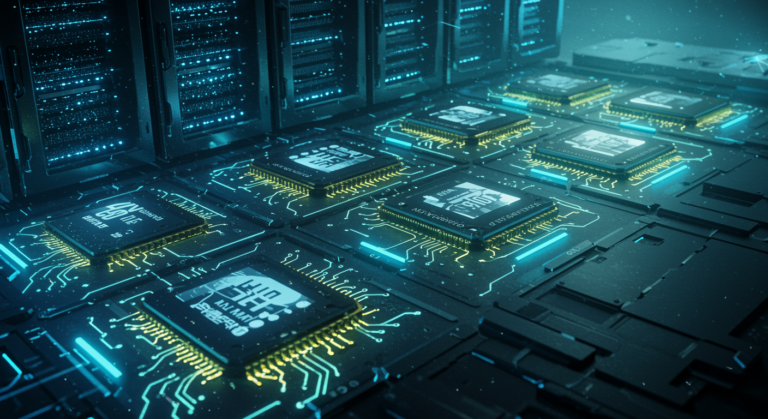
DeepMind Staff Unionisation Challenges Defence Deals and Israel Links
Introduction
The DeepMind union challenge is gaining momentum as hundreds of staff in the UK push back against their company’s involvement in defense contracts and ties to Israel. This movement isn’t just about jobs; it’s a bold stand for ethical AI development, where employees are demanding a say in how cutting-edge technology is used. Have you ever thought about how your work could inadvertently fuel global conflicts?
At Google DeepMind, a leader in AI innovation, this wave of unionisation reflects deeper concerns over the ethical implications of tech in military applications. It’s sparking conversations worldwide about balancing technological progress with human rights and corporate responsibility.
Background: DeepMind, Google, and Rising Staff Discontent
Google DeepMind has long been at the forefront of AI breakthroughs, but internal frustrations have escalated recently. The company quietly removed its public commitment to avoid AI in military or surveillance roles, a move that alarmed many employees. This shift, coupled with lucrative deals like the $1.2 billion contract for cloud and AI services linked to Israeli defense, has ignited the DeepMind union challenge.
These developments highlight how tech giants navigate complex ethical landscapes. For instance, staff worry that their innovations could end up in tools for surveillance or warfare, raising questions about accountability.
Key Developments Prompting the DeepMind Union Challenge
What’s driving this push? Several factors have converged to fuel employee action.
- The quiet drop of Google’s anti-military AI pledge, which once reassured workers about ethical boundaries.
- High-profile sales of AI and cloud services to defense entities connected to the Israeli government, sparking geopolitical debates.
- A wave of resignations and protests, including the dismissal of 28 Google employees in 2024 for voicing opposition.
- Growing awareness of how AI ethics play out in real-world scenarios, like potential misuse in conflict zones.
These events show that the DeepMind union challenge isn’t isolated—it’s part of a larger trend in tech where workers are demanding transparency.
The DeepMind Union Challenge: Goals and Scale
Around 300 DeepMind employees in London are rallying to join the Communication Workers Union (CWU), making this one of the most significant efforts yet. Their aim? To challenge defense deals head-on and ensure AI is developed with ethics in mind. This DeepMind union challenge could reshape how tech firms handle sensitive contracts.
By organizing, these workers hope to foster a culture where employee input shapes company decisions. It’s a reminder that in the fast-paced world of AI, voices from the ground level matter.
Main Objectives of the Unionisation Effort
- Push to stop or renegotiate sales of AI tech for defense and surveillance, prioritizing human rights over profits.
- Enforce stricter ethical standards in AI deployment, ensuring technologies promote good rather than harm.
- Build systems for open dialogue, giving workers real influence in policy-making processes.
Challenges like these aren’t new in tech, but the DeepMind union challenge stands out for its focused scale. Past attempts at Google and Alphabet faced roadblocks, yet this one builds on those lessons, aiming for meaningful change.
Overcoming Unionisation Hurdles in the Tech World
Tech giants often resist union efforts, citing innovation speed as a barrier. But the DeepMind union challenge demonstrates how persistent activism can lead to progress. For example, smaller unions at Google previously struggled, but this larger group is leveraging public scrutiny to gain traction.
Ethical and Geopolitical Concerns in the DeepMind Union Challenge
The DeepMind union challenge brings to light serious issues at the intersection of AI, defense, and global politics. AI’s role in military operations could escalate conflicts or violate human rights, making these debates more urgent than ever. What if AI decisions in warfare led to unintended civilian harm?
With AI increasingly woven into international strategies, companies like Google face pressure to align with ethical norms. This challenge underscores the need for tech workers to advocate for responsible innovation.
Why Defense Deals Are So Contentious
- AI in military contexts risks amplifying errors, potentially causing human rights abuses or escalating tensions in places like the Middle East.
- Geopolitical ties, such as those with Israel amid ongoing conflicts, force companies to confront their role in global power dynamics.
- Broader implications include threats to digital sovereignty, where tech deployment could undermine national security or privacy worldwide.
These concerns aren’t theoretical; they’re playing out in real time, fueling the DeepMind union challenge as a call for introspection in the industry.
Impacts of the DeepMind Union Drive
If successful, the DeepMind union challenge could inspire a ripple effect across tech, encouraging other firms to scrutinize their defense ties. Imagine a future where AI ethics are non-negotiable, leading to more transparent practices and fewer ethical slip-ups.
This movement might prompt policy shifts, like canceling controversial contracts or adopting industry-wide standards. It’s a step toward ensuring AI serves humanity, not just corporate interests.
Possible Outcomes of This Union Effort
- Increased transparency in how AI is built and used, giving stakeholders clearer insights.
- More employee involvement in key decisions, fostering a collaborative company culture.
- Potential contract revisions or terminations, directly addressing the concerns at hand.
- A sparked debate that elevates AI’s role in defense on the global stage.
These changes could set precedents, making the DeepMind union challenge a benchmark for ethical tech activism.
Challenges Facing DeepMind and Google
The DeepMind union challenge exposes the tightrope tech companies walk between innovation and ethics. Rapid AI advancements often outpace internal safeguards, leading to reputational risks and employee unrest. How can firms like Google maintain trust while pushing boundaries?
Addressing these issues requires balancing speed with scrutiny, ensuring that ethical considerations keep pace with technological leaps.
Organisational and Strategic Risks
- Navigating the tension between groundbreaking AI work and upholding ethical standards.
- Dealing with backlash that could damage the company’s image and talent retention.
- Complying with diverse legal frameworks across countries, adding layers of complexity.
This DeepMind union challenge serves as a wake-up call for better risk management in tech.
AI, Defense, and International Relations: A Broader Perspective
In the global AI race, innovations are deeply intertwined with geopolitics, from US-China rivalries to Middle Eastern dynamics. The DeepMind union challenge highlights how tech decisions can influence international stability, urging a more cautious approach.
For example, AI’s use in cybersecurity could either prevent attacks or spark new ones, depending on deployment. This broader view emphasizes the need for ethical oversight.
Comparative Table: Key Concerns in AI Defense Collaborations
| Concern | Implications | Stakeholders |
|---|---|---|
| Ethical Use of AI | Risk of human rights violations and eroded public trust | Developers, public, and policymakers |
| Geopolitical Entanglement | Involvement in conflicts and potential sanctions | Governments, employees, and the global community |
| Workplace Morale | Leading to resignations and internal protests | Employees, HR, and management |
| Regulatory Compliance | Possible legal challenges and financial penalties | Legal teams and executives |
This table illustrates the multifaceted nature of the DeepMind union challenge, showing how interconnected these issues are.
The Future of Employee Activism in Tech
The DeepMind union challenge exemplifies a rising tide of worker-led movements in technology. As AI’s societal impact grows, employees are stepping up to ensure their creations align with positive values. What role might you play in similar efforts?
This trend suggests that activism could become a standard tool for ethical advocacy, pushing companies toward more responsible practices.
Key Takeaways for the Tech Industry
- Transparency in decision-making can build trust and prevent controversies like the DeepMind union challenge.
- Developing ethical guidelines with employee involvement ensures balanced innovation.
- Promoting employee representation helps align tech progress with societal needs.
By embracing these principles, the industry can turn challenges into opportunities for growth.
Conclusion
The DeepMind union challenge is more than a labor issue—it’s a catalyst for rethinking AI’s place in defense and ethics. As this story unfolds, it reminds us that technology’s future depends on collective voices advocating for good. What steps can we all take to support ethical AI?
If this topic resonates, share your thoughts in the comments below, explore more on AI ethics in our related posts, or join discussions on how to drive positive change in tech.
References
- JPost. (2025). Breaking News. Retrieved from https://www.jpost.com/breaking-news/article-851594
- TechCrunch. (2025). Google’s DeepMind UK team reportedly seeks to unionize. Retrieved from https://techcrunch.com/2025/04/26/googles-deepmind-uk-team-reportedly-seeks-to-unionize/
- Economic Times. (2025). Google DeepMind UK staff to challenge defence deals and Israel links: FT report. Retrieved from https://economictimes.com/tech/technology/google-deepmind-uk-staff-to-challenge-defence-deals-and-israel-links-ft-report/articleshow/120646646.cms
- Seeking Alpha. (2025). DeepMind staffers in UK trying to unionize: Report. Retrieved from https://seekingalpha.com/news/4436050-deepmind-staffers-in-uk-trying-to-unionize-report
- OAPEN. (n.d.). AI & International Conflict. Retrieved from https://library.oapen.org/bitstream/id/3cd59d4d-cf1b-4ade-80df-e66b6afd4ea2/9781000895896.pdf
- FTSG. (2025). 2025 Tech Trends. Retrieved from https://ftsg.com/wp-content/uploads/2025/03/FTSG_2025_TR_FINAL_LINKED.pdf
DeepMind union challenge, AI ethics, defense deals, Google Israel contracts, workplace activism, ethical AI development, tech unionisation, AI in military, employee activism, geopolitical AI ties







